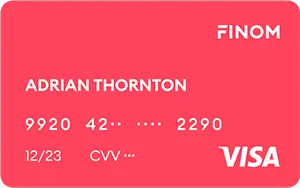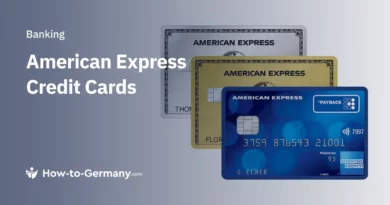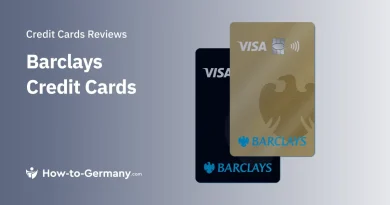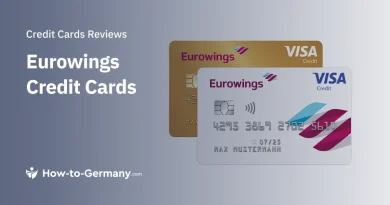How we earn our money
We finance our services on how-to-germany.com through affiliate programs.
When a user orders a financial product through our site and their application is approved, we may receive a commission from some providers. It’s important to note that this does not in any way influence our independent ratings and recommendations.
All the products we present on how-to-germany.com are selected for their quality, range of services, and excellent value for money.

Business Credit Cards in Germany

- Travel benefits – Frequent travelers can enjoy perks such as travel insurance and airport lounge access with select business credit cards.
- Tax deductions – Business credit card fees might be tax-deductible, but professional advice is recommended.
- Eligibility – Freelancers and self-employed individuals in Germany are eligible to apply for business credit cards. However, credit card issuers often require proof of income, business registration, and a good credit history.
- Personal vs. business expenses – Due to recent regulations, using a business credit card for personal expenses is strictly prohibited in Germany. It’s crucial to maintain a clear separation between business and personal finances.
- Qonto One Card – Best business credit card for freelancers and self-employed in Germany. Everything in English.
- Finom Start Business Debit Visa – Stress-free credit card for freelancers and solopreneurs. Everything in English.


What are Business Credit Cards?
Business credit cards are financial tools specifically designed to cater to the needs of businesses, entrepreneurs, and self-employed individuals. They come in different types, offering a range of features and numerous benefits. These are tailored to facilitate business-related expenses such as travel, purchasing supplies, and managing cash flow. Business credit cards offer a convenient and separate line of credit from personal finances, simplifying accounting processes and facilitating more accurate expense tracking.
Most of the cards are operated within the networks of Visa Card and Mastercard. American Express also issues business credit cards.
Before applying, be sure to compare offerings from more than one credit card company, as eligibility requirements and benefits can vary significantly.
Business Cards vs. Corporate Cards
Business credit cards are typically issued to small and medium-sized enterprises (SMEs), freelancers, and self-employed individuals. They often have lower credit limits, require less stringent qualifications, and may offer rewards tailored to business needs.
On the other hand, corporate cards are usually provided to large corporations and come with a higher credit limit, centralized billing, specialized reporting tools, and customizable features that cater to the specific requirements of the organization. Unlike a business credit card, a corporate credit card is issued directly to the company, not to an individual.
Pros and Cons of Business Credit Cards
Before diving into the specifics of business credit cards on the German market, let’s explore the advantages and disadvantages they offer:
- Improved cash flow management
- Separation of personal and business expenses
- Enhanced expense tracking and reporting
- Access to rewards and cashback programs
- Potential for building business credit history
- Opportunity to save money with the right price and rewards structure
- May require a personal guarantee for approval
- Potential for high-interest rates if balances are not paid in full
- Limited credit limits compared to corporate cards
Fees of Business Credit Cards
Business credit cards often come with various fees, including annual fees, foreign transaction fees, and additional card fees. It’s crucial to consider these costs when comparing different options. While some cards may have higher annual fees, they often provide added benefits that justify the expense. It’s essential to evaluate the fee structure and weigh it against the card’s features and rewards program.
Features of Business Credit Cards
When selecting a business credit card in Germany, consider the following key features:
- Credit Limit: Assess the offered credit limit to ensure it meets your business requirements.
- Rewards Program: Evaluate the rewards structure, including cashback, airline miles, or points, to match your spending patterns and maximize benefits.
- Expense Management Tools: Look for cards that provide expense tracking and reporting tools to simplify bookkeeping and accounting processes.
- Travel Benefits: If your business involves frequent travel, explore cards that offer travel-related benefits such as travel insurance, lounge access, and airline rewards. Some cards also offer perks for hotel stays, such as upgrades, discounts, or bonus points in specific loyalty programs.
- Zero foreign transaction fees: Some business credit cards offer zero foreign transaction fees, which can significantly reduce costs for companies with international clients or regular cross-border purchases.
- Apple Pay and Google Pay integration: Many business cards now support Apple Pay and Google Pay, allowing secure and convenient contactless transactions both in-store and online.
- Contactless payments: Business cards that support contactless NFC payments enable quick and secure purchases by simply tapping the card or using a mobile device — ideal for everyday business expenses.
- Real-time transaction tracking: Some business cards also enable you to monitor credit balances in real-time, making it easier to manage cash flow and avoid overspending.
- Balance transfers: Some providers also allow balance transfers from other credit cards, which can be useful for consolidating debt or taking advantage of temporary interest-free periods.
- Introductory Offers: Some cards offer introductory 0% APR periods, allowing interest-free borrowing for a specified initial period.
Compare Business Credit Cards in Germany
When comparing different business credit card options in Germany, consider factors such as interest rates, rewards programs, fees, and additional benefits. It’s essential to prioritize features that align with your business’s unique requirements. Tools like comparison websites make it easier to analyze the features, fees, and benefits of various credit cards available in Germany. Consulting financial advisors can also help to make an informed decision.
Business credit cards are particularly well-suited for freelancers, small businesses, and medium-sized enterprises that want to streamline expenses while maintaining flexibility and oversight. When choosing a credit card provider, always consider how well the benefits align with your business needs.
What Makes a Good Business Card?
When selecting a business card, focus on features that support your daily operations and financial goals. A good business card should offer:
- Low or no annual fees
- Integration with accounting software
- Compatibility with Apple Pay and Google Pay
- Contactless payments via NFC for in-store convenience
- Expense tracking and detailed statements
- Cashback or business-focused reward programs (e.g., travel bookings, marketing services, or office supplies). Choose a rewards program that matches your business’s spending habits to maximize cashback or points on relevant categories.
- Transparent terms for international usage and ATM withdrawals
- Seamless integration with accounting software is especially helpful for automating expense tracking and VAT reporting.
These features can simplify your workflow, enhance cash flow visibility, and support your overall business strategy.
Please note: Failing to pay off your balance in full may result in interest charges or penalties for late payments, which can quickly erode the financial benefits of the card.
Choosing the Right Card Type for Your Business
There are various types of business cards available in Germany, including debit, charge, revolving, and even prepaid models. Each has its advantages:
- Debit business cards offer real-time payment control and are easily available, often without requiring a credit check.
- Credit-based business cards offer flexibility through monthly billing and may include travel perks and cashback.
- Corporate credit cards are designed for larger teams. They include advanced spending control and central billing.
- Prepaid cards are another option for small business owners with limited credit history. They require pre-funding and offer limited flexibility, but may still be useful for managing controlled budgets or employee spending.
Your choice should reflect your business size, structure, and spending behavior. Freelancers may benefit most from simple debit or credit-based business cards, while established companies may consider upgrading to a corporate credit card solution.
How to Get a Business Credit Card?
Each credit card provider has its own application process and documentation requirements. However, to apply for a credit card as a business owner in Germany, you’ll typically need to meet specific criteria and provide supporting documents.
Requirements
- Business Registration: Provide proof of your business registration or self-employment status.
- Financial Documents: Include financial documents such as bank statements, income tax returns, and profit/loss statements to demonstrate your business’s financial stability. The documentation required may vary for different types of business cards, especially depending on whether the card includes a credit line.
- Existing or newly opened business bank account: Most business credit cards in Germany are issued by the same bank where your account is held. This simplifies the application process and ensures smooth integration with financial tools and expense systems.
- Personal Guarantee: A personal guarantee may be required, especially if your business is new, has limited credit history, or you’re applying for a business credit card with a charge or revolving credit structure.
- Identification: Please submit valid identification documents such as a passport or identification card.
Process
- Research and Compare: Explore various credit card options to find one that matches your company’s spending patterns, size, and credit profile. Consider their features, benefits, and fees.
- Application: Fill out the application form provided by the credit card issuer, ensuring accuracy and completeness.
- Documentation: Gather the necessary documents, including business registration proof, financial documents, and identification.
- Submission: Submit the application and required documents to the credit card issuer through their designated channel, such as online or in person.
- Verification and Approval: The credit card issuer will review your application and documentation, conducting necessary verifications. Once approved, you will receive your business credit card.
Conclusion
Choosing the best credit card for your business in Germany is essential for managing your finances effectively and simplifying your expense processes. Consider the features, rewards programs, fees, and requirements of each card to determine which one best aligns with your business needs. By conducting thorough research, comparing options, and understanding the application process, you can make an informed decision and select the right business credit card that enhances your financial management capabilities.
Premium business credit cards often come with exclusive benefits tailored to high-spending companies, including travel perks, insurance, and special discounts.
Used strategically, a business credit card can help save money and improve financial management through cashback, interest-free periods, and discounts on essential services.
While corporate credit cards may offer more advanced features, most freelancers and small businesses in Germany are better served by a standard business credit card.
Frequently Asked Questions
A business card is tailored for professional use, often with features like cashback on business-related purchases, expense tracking tools, tax advantages and improved cash flow management. Personal credit cards are designed for individual spending and generally lack additional benefits.
Typically, business credit card fees may be tax-deductible in Germany. However, it’s recommended to consult a tax advisor or accountant to understand the specific rules and regulations regarding tax deductions for business expenses.
Yes, freelancers and self-employed individuals in Germany are eligible to apply for business credit cards. However, the specific requirements and documentation may vary depending on the credit card issuer and your financial situation.
Some business credit cards in Germany provide travel insurance coverage as part of their benefits. It’s important to review the terms and conditions of the card and its insurance offerings to understand the extent of coverage provided.
While it’s generally recommended to keep personal and business expenses separate, using a business credit card for occasional personal expenses may be possible. However, it’s crucial to maintain clear records and separate business and personal transactions to avoid any accounting complications.
Yes, several providers offer a free credit card for freelancers and small business owners. These cards typically include basic features such as cashback or travel insurance and are ideal for users seeking to minimize fixed costs.
A business credit card in Germany is typically issued as a Visa card or Mastercard, offering broad acceptance both online and in-store. American Express also offers business credit cards in the German market, often with additional travel or service benefits.
Mastercard and the Visa card network are particularly common due to their wide global acceptance and seamless integration with digital wallets and accounting software. American Express business cards, particularly the Gold and Platinum options, are renowned for their exclusive benefits, including airport lounge access, concierge services, and premium travel insurance.
Yes, freelancers and self-employed individuals in Germany can apply for a credit card. Requirements usually include proof of income, a registered business or freelance registration with the tax office, and identification documents.
Yes, switching providers is possible and often recommended if your business needs change or if another credit card provider offers better rewards or lower fees.
Corporate cards typically come with a higher credit limit and are designed for businesses with larger operational budgets and employee spending needs. A corporate credit card allows centralized control over spending and billing. It is suitable for larger companies with multiple employees. Companies with strong financial records may qualify for corporate cards with higher credit limits and extended repayment flexibility.











